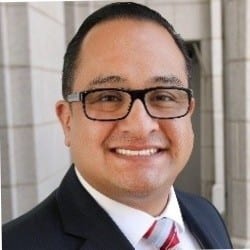Embracing a Business Mindset to Make Government More Responsive
 Frank Aguirre, a 2011 MBA graduate, wears a lot of hats. Previously a Business Development Specialist for L.A. Mayor Eric Garcetti’s office of Economic Development, he is currently a full-time business instructor at East Los Angeles College and a doctoral candidate at Claremont Graduate University.
Frank Aguirre, a 2011 MBA graduate, wears a lot of hats. Previously a Business Development Specialist for L.A. Mayor Eric Garcetti’s office of Economic Development, he is currently a full-time business instructor at East Los Angeles College and a doctoral candidate at Claremont Graduate University.
Frank is, and has been, an achiever, with the broad area of business development as his playing field. “I started some 25 years ago when I helped my immigrant parents start their first restaurant,” he says. “I’ve also spent five years as a small business owner.”
Throughout his career and through his education -– he obtained a B.A. at USC’s Marshall School of Business — Frank has honed his expertise in small business, entrepreneurship, economic development, government relations, marketing and community development. Hence, lots of hats. And lots of business sectors, from software and telecommunications to equipment manufacturing, auto repair and –- perhaps his first love –- restaurants.
While his doctoral dissertation remains a work-in-progress, Frank is sticking close to home, thematically. His particular research interests involve small business, entrepreneurship and post-secondary higher education and the effects of social and cultural capitalism on entrepreneurship. “I decided to pursue a doctorate to advance my interest in becoming a full-time college instructor and to improve my understanding of student success and outcomes in higher education,” he said. “I love teaching, and I learned to love business studies while at Woodbury. It was the instructors’ passion for the coursework that had a lasting impression on me at the time and still does.”
Frank has also developed a knack for applying the lessons of business within a public sector setting. “Working with the L.A. Mayor’s office was my first job with a government agency,” he says, in part the result of his advisory work on the LACC Goldman Sachs 10K Small Business Initiative, an ambitious effort to help entrepreneurs create jobs and economic opportunity. He describes straddling the public and private sectors as “a unique balancing act.”
“An understanding of my customer (that is, constituents), my working group (city employees), and my leadership (elected officials) helped me do my job,” he says. “Ultimately, my effort was successful because it focused on the customer’s needs and not only on what the city could provide.”
For Frank, the lesson is that thinking like a business still has merit, even if you’re delivering human services rather than some commodity. “Regardless of an organization being a for-profit, non-profit or government agency, they all have customers, they all have teams, they all have outcome expectations,” he says.
Entrepreneurship is where you find it, and Frank has found it – or promoted it — just about everywhere. In 2015, he applied for and won a Startup in a Day grant from the U.S. Small Business Administration, a one-time White House initiative aimed at enabling cities to develop online tools that let entrepreneurs discover and apply — in less than a day — for the local, state, and federal requirements needed to start a business.
A year later, in what he calls “a national high point,” six cities, including L.A., formally launched their Startup in a Day solutions. And in late 2017, marking his “global high point,” the Global Entrepreneurship Network recognized him as one of four finalists for the Startup Nations Award for Local Policy Leadership.
“A business management mindset can be developed in any individual,” Frank says. “It simply takes time, thoughtful engagement with business education, and regular contextualization.”